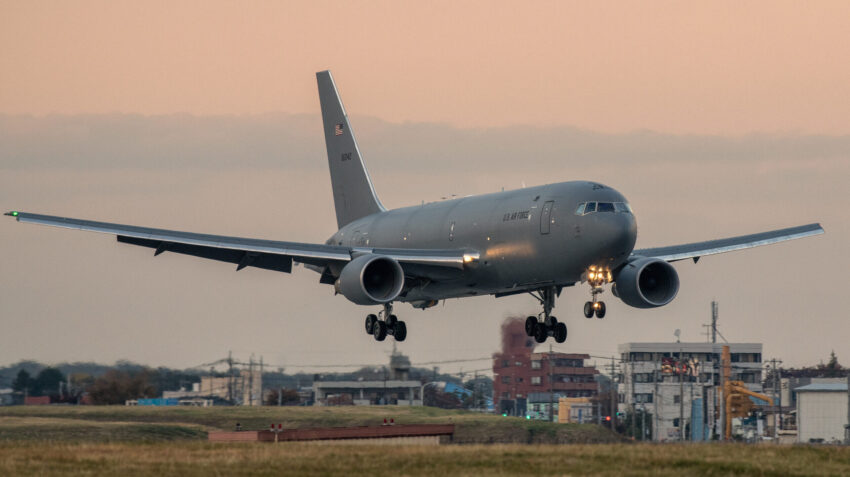A KC-46 Pegasus assigned to the 22nd Air Refueling Wing, McConnell Air Force Base, Kansas, lands at Yokota Air Base, Japan, Nov. 7, 2022, in support of Exercise Keen Sword 23. The U.S.-Japan alliance is built on shared interests, values and a commitment to freedom and human rights; the alliance is strong and focused on enhancing a security architecture of regional partnerships. KS23 is a joint/bilateral Field Training Exercise involving U.S. military and Japan Self-Defense Forces personnel in the vicinity of Japan. (U.S. Air Force photo by Yasuo Osakabe)
WASHINGTON — The US Air Force has decided to abandon plans to hold a competition for its next round of aerial refueling tankers and will instead buy up to 75 more KC-46s from Boeing.
“The Air Force is investing in both tanker capacity and capability to enable the Joint Force now and into the future by ensuring an uninterrupted recapitalization of KC-135 aircraft,” an Air Force spokesperson said in a statement.
“The Air Force approved an acquisition strategy to extend KC-46A production by up to 75 aircraft. This ‘KC-46A Production Extension’ program will maintain uninterrupted tanker recapitalization after final delivery under the current contract.”
Further details about the contracting strategy, including pricing and contract type, are still being worked out, the spokesperson said.
The Air Force’s statement brings to end to more than a year of speculation about its strategy for a “bridge tanker” meant to fill the gap between the KC-46 and its Next Generation Air Refueling System (NGAS), formerly called KC-Z.
Earlier this decade, the Air Force announced its intent to hold a competition for a buy of about 150 tankers that would be modified from existing designs, which in turn set up a showdown between upgraded versions of Boeing’s KC-46 and Airbus’s A330 Multi Role Tanker Transport. In 2021, Airbus revealed that Lockheed Martin would act as a US prime for the A330, which would be called LMXT in the American market.
However, in 2022, then-Air Force Secretary Frank Kendall hinted that the service could sole-source additional KC-46s from Boeing in lieu of a competition, and the service eventually lowered its anticipated buy to about 75 aircraft. Lockheed dropped out of the competition in 2023, leaving Airbus to offer its A330 MRTT without the backing of an American prime.
A big hint on the Air Force’s intended path forward came in the fiscal 2026 budget rollout, when the service announced its plan to max out its current KC-46 contract with Boeing, increasing the program of record from 179 to 188 aircraft.
Air Force Chief of Staff Gen. Dave Allvin told Defense One, which was first to report on the Air Force’s KC-46s decision, that he was “comfortable” with Boeing’s progress on resolving ongoing KC-46 technical deficiencies.
“I’m not saying we’re totally out of the woods, but I believe we are making good progress clearing those deficiencies, and the aircraft is performing very well operationally,” Allvin said over the weekend.
Boeing deferred comment to the Air Force. Airbus did not immediately respond to a request for comment.
Michael Marrow contributed to this report.
Click this link for the original source of this article.
Author: Valerie Insinna
This content is courtesy of, and owned and copyrighted by, https://breakingdefense.com and its author. This content is made available by use of the public RSS feed offered by the host site and is used for educational purposes only. If you are the author or represent the host site and would like this content removed now and in the future, please contact USSANews.com using the email address in the Contact page found in the website menu.








